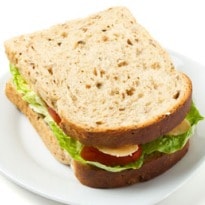Recent research in Spain suggests that it does. So should you give up the late-night snacks?
Does eating late make you put on weight? Or is this one of the many myths of dieting? Research published this week in the journal Obesity found that out of 420 people on a 20-week weight-loss programme, those who ate an early lunch lost 2.2kg more than those who ate lunch later (9.9kg versus 7.7kg).
The study, which was carried out in Spain, classified a late lunch as after 3pm. Both groups of people ate the same calories: 40% of their daily total was consumed at lunch. When they ate breakfast or dinner didn't make any difference, but we don't know about other factors, such as when they exercised. It was an observational study, which means it couldn't prove that eating a later lunch reduced weight loss, it can only show the two might be linked. However it adds to the debate on whether a calorie is a calorie regardless of when you eat it and where it comes from. If eating earlier could mean you convert fewer calories to fat, surely it's worth a try?
The solution
You probably eat lunch earlier than 3pm so this study won't change your life. Other research has shown that evening snacking can make you put on weight - although the tests were only conducted on mice. A paper in the journal Cell Metabolism repeated this finding by showing that mice restricted to day time eating of high fat foods (as opposed to mice who were allowed free access to graze all night) did not get obese. Another study published in the journal Obesity showed that mice that eat anything at night put on twice as much weight as those who only eat in the daytime.
However, before you ditch the bedtime snacks, research on rhesus monkeys (far more like us than mice) has suggested that those who eat most of their food at night are not more likely to get fat than those who don't.
In the midst of animal studies and general confusion, the New England Journal of Medicine's review this week clarified a few myths about obesity. It's OK, it says, to lose weight quickly (people who do so aren't at a higher risk of putting it back on); there is only limited evidence that eating breakfast protects you from weight gain; and making small changes to how much you exercise or eat will take for ever to make a difference. On the issue of whether it matters when you eat, it is silent. But the animal studies, and perhaps the Spanish one too, suggest that individual differences in weight loss or gain may be related to variations in circadian rhythms and energy use after meals.
However many myths there are around weight loss, there is one overriding, relentless truth: to lose weight you need to use up more calories than you eat. It's that simple.
Is a sandwich in the evening more fattening than one at lunchtime? Photograph: Alamy








